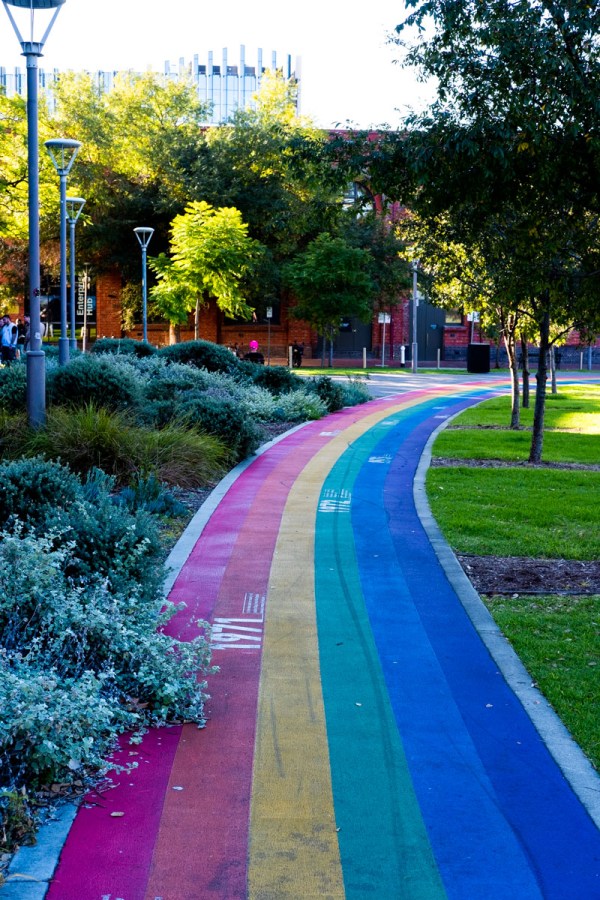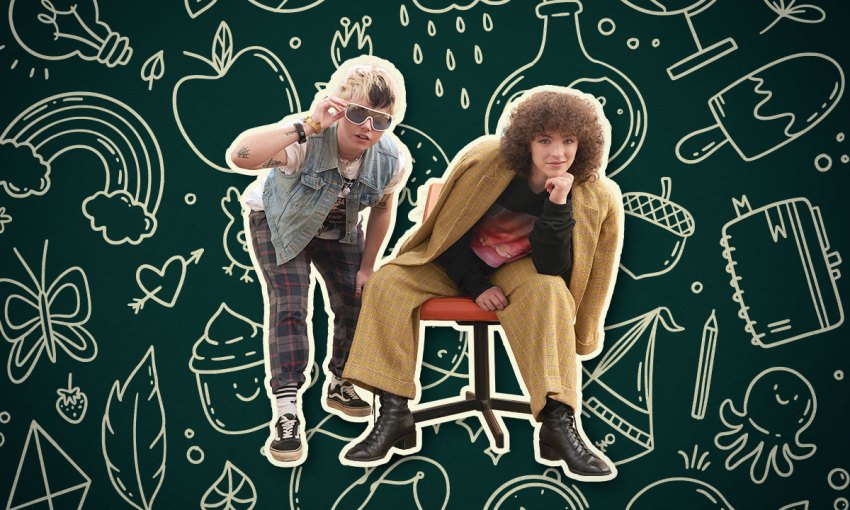The minds behind TikTok sensation Rainbow History Class sat down with CityMag ahead of their Feast Festival performance to chat about their quest and building trust with an older LGBTQIA+ audience.
Do you know your Rainbow History?
In 2021, Hannah McElhinney set out to make LGBTQIA+ history more accessible. With the help of Rudy Jean Rigg, the two started Rainbow History Class, with Hannah the researcher and Rudy playing the role of teacher.
Within their first week on TikTok, they had 10,000 followers.
The number kept rising and their current follower count is just over half a million.
“TikTok is so strange because it’s such an ephemeral place where it’s like, the numbers go up but it’s really hard to correlate that with actual people,” Hannah says.
The actual people behind the screen would soon show themselves, as Rudy discovered when they became recognised on the streets of post-lockdown Melbourne.
From there, 82,000 Instagram followers, a Snapchat Discover show, a book, a TEDx talk, shows at Sydney World Pride and Melbourne Fringe followed, with Adelaide the latest on the lineup.
The show, titled ‘Rainbow History Class: Come and Get Us’, brings the duo to Adelaide for the first time as part of Feast Festival.
“I feel like Adelaide is just such an interesting place because it was the first state to decriminalise homosexuality, but the last to eliminate the gay panic defence,” Hannah says.
Hannah is familiar with the death of George Duncan which sparked Adelaide’s law reforms and surrounding pride movement but finds other aspects of Adelaide’s queer history to be under researched compared to places like Sydney, the home of Australia’s largest Mardi Gras and 2023 World Pride.
“Every state is really quite different… I mean, drag is drag is drag, but on a detailed level, there’s so many nuances between the history of all the states and territories,” Hannah says.

Adelaide Pride Walk. This picture: Claudia Dichiera
Retaining the nuance in their TikTok videos is one of the ways Hannah and Rudy have been able to connect with and build trust with older people in the LGBTQIA+ community.
“What’s always nice for me is when we reach people that have living memory of the things we’re talking about,” Hannah says.
This allows Rainbow History Class to improve the way the lives of queer and trans people can be recorded and preserved, which Hannah says is something that society has failed to do well.
“They’re like, ‘oh my God, how did you even find out about that?’ ‘I was there’ or ‘that person was my cousin’ and we can kind of document history a little bit better.”
The community Hannah and Rudy have built online translates into the real world too, with the duo frequently visiting archives and connecting with “informants” in the LGBTQIA+ community in Australia.
“Groups of people like the 78rs in Sydney, we’ll talk to and ask questions to kind of clarify different things,” Hannah says.
“They’re a really brilliant source of information and cultural knowledge.”
Part of maintaining this trust is that Hannah and Rudy make a conscious effort not to “exploit the history, rainbow wash or yassify it”.
Rainbow washing typically refers to the act of remaining politically and socially neutral while sporting rainbow colours in performative campaigns that don’t involve the leadership or contributions of LGBTQIA+ individuals or reflect the nuances between the different LGBTQIA+ identities.
To ‘yassify’ their content in this case, would be to use a melodramatic physicality or communication style to amp up the content for views in a way that reduces the facts into a caricature of what it means to be queer.
“If I was saying, like, ‘slay queen’ and like doing stereotypical movements with my hands or something, I feel like there will be a large proportion of people that might not be able to ingest what you’re saying and take it seriously,” Rudy says.
For the show, Rainbow History Class will focus on global themes and their effect on LGBTQIA+ communities, with an Australian based portion that Rudy says is a story “you’ll have to see to believe it”.
The show begins in the 20th century with events like the rise of Hollywood, warfare, spies and secret codes all on the syllabus.
“You start with the world history and look at how we responded as a community,” Hannah says.
“Usually, we respond in a really funny way or a really clever or inventive way and sometimes, you know, in a shitty way, so we can be critical of us as well.”
“We have this saying, not everything is gay, but there’s gay in everything,” Rudy says.
@rainbowhistoryclass Beware the Betty Bangles 📚 #learnontiktok #queer
Young people often have to seek out rainbow history online or apply a gay, trans, queer or non-binary lens to history and culture studies at their own volition.
For Hannah, this is how Rainbow History Class came to be, as she saw queer history often kept behind academia and not accessible.
“If I’d been able to access this information in school, perhaps I would have come out sooner or that experience might have been more joyful and more pleasant,” Hannah says.
“There’s just so much culture and art and activism and creativity and all of these things that have threaded their way through modern popular culture that originated in queer culture,” Hannah says.
“I think that really creates a sense of pride in who we are as queer people.”
In terms of the decision to make Rainbow History Class a comedy show, it was a no-brainer, as Hannah says humour is crucial to queer culture and community.
“Some of the history is so absurd… it’s so unbelievable, but it’s all true,” she says.
“So what we worked out that we need to do is create a space where we are giving permission for queer people, hetero[sexual] people, all people, whether you’re trans or cis[gender], everybody can come and laugh at our history.”
“Sometimes there are darker moments, but other times it’s just so ridiculous,” Hannah says.
Rudy agrees the craftsmanship of their show comes from knowing the audience, seeing what kind of crowd it is and what they’ve contributed to the class.
“We do play into the classroom elements, participation isn’t necessary but we encourage it,” Rudy says.
“We don’t really fluff anything up, we just tell it how it is and we just let the stories unfold as they happened in history.”
Rainbow History Class will be in session at the Howling Owl on November 17 & 18 at 7pm, you can get tickets via the Feast Festival website.




